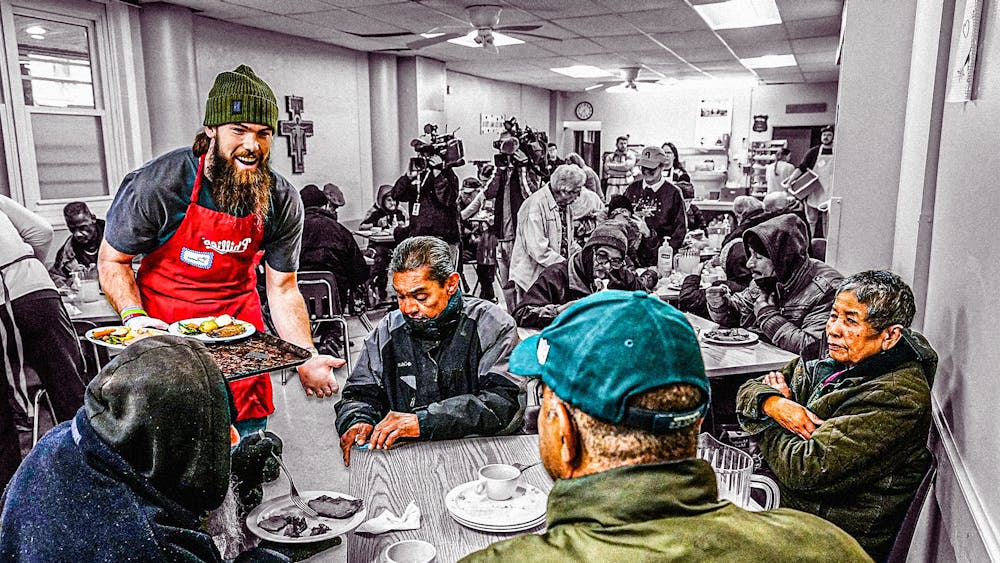Every day, dozens of residents file into a ministry on Kensington Avenue. Patrons are clustered around tables as waiters approach them, offering plates of food and pitchers of juice. The waiters know the guests and the guests know the waiters; they chat and exchange updates on the happenings of the week. St. Francis Inn, a long–standing establishment serving as a ministry, soup kitchen, and home has made it their mission to provide a safe haven for those in need.
Kensington, a neighborhood in Northeast Philly, has long been the heart of an ongoing and multifaceted problem. According to Kensington’s Office of Homeless Services, almost 3700 people are experiencing homelessness in the city, with 788 being completely unsheltered. In 2019, the violent crime rate was nearly 30% higher in Kensington than in the rest of Philadelphia. The neighborhood is also disproportionately impacted by the opioid crisis; in 2021, North Philadelphia saw sharp increases in the number of fatal overdoses.
St. Francis Inn opened in 1979 to provide support to Kensington residents. Founded by three Franciscan friars, the inn originally opened as a corner bar that aimed to provide cheap options for those struggling with food insecurity, according to Stephen DeWitt, Franciscan friar and licensed social worker at the inn. Over time, more services were added to the inn, including a weekly licensed barber, a clothing center, and a small job–search program, and it has developed into a critical resource for those in need of assistance.
Since then, St. Francis Inn has operated as a restaurant–style soup kitchen, with a host, dining room, and waiter. The team has no established “hierarchy,” with all team members contributing equally to operations and decision–making. Their emphasis on inclusion and equality is what has made St. Francis Inn so successful.
DeWitt has now been with the inn for six and a half years. “Unfortunately, people don't really get to take a day off from being hungry,” DeWitt says, recounting that the inn is open 365 days of the year. Whether it be a take–away model during COVID–19 or the capacity for only one meal on certain holidays, St. Francis Inn constantly provides critical support to those in need.
One of the requirements of the inn’s staff is that they live in the neighborhood or even next door to the inn. This unique obligation provides team members a unique perspective and a real sense of the fact that it can be very challenging to live near people who have chronic issues, hence the importance of more accessible treatment.
According to DeWitt, mental health and addiction issues, the cost of housing, and gentrification (especially during the pandemic when certain neighborhoods were no longer affordable for low–income families or individuals) are the most pressing matters facing Kensington right now. Recently, an apartment complex was constructed less than half a block from the inn, where rent starts at $1,200/month. However, many of the guests at St. Francis are on fixed incomes through SSI where the maximum benefit is $914/month, DeWitt said.
While Friar Stephen DeWitt has been with the inn for almost seven years, some of his colleagues have been there for more than 30 years. They now know several generations of guests, “which says something about the generational nature of poverty in this country,” DeWitt says.
Despite the challenges that Kensington residents face, their resilience shines through at the inn. Dewitt recalls one family with whom he developed a special bond; while he helped the mother handle her bills, her six children would draw him pictures. There are now a dozen hanging on his office door. “They’re just the happiest people I’ve ever met,” he says.
St. Francis Inn also supports residents through urgent crises. DeWitt recalled that a guest had been living in a Philadelphia Housing Authority subsidized house. Due to a miscommunication in which he had lost his income and thought PHA had been notified, he was being charged much more than he could afford. After having accumulated months' worth of debt, the inn stepped up to provide a small grant, covering the cost of the unpaid rent.
DeWitt says that in circumstances resembling the above (and many others), one of the biggest setbacks is that “there's lots of paperwork involved in being poor … and a lot of the people [he] see[s] are not real well educated … [they] still see some people who are functionally illiterate. They can read a little bit, they can fill out a basic form, but other than that they really need help.”
According to DeWitt, on the policy side, Philadelphia needs wider access to addiction treatment and mental health services, social security benefits that are big enough to make living affordable for people on any kind of public benefit, and more affordable living options. The average rent in Philadelphia is around $1900/month. Over the course of the past three to four years, around 700 to 800 new apartments have been built within three–fourths miles of the inn’s location, but because they are all market rate, most unhoused people are unable to afford them.
Further, Philadelphia, especially Kensington, needs more public restrooms and trash cans. Because they are currently lacking, the sidewalk is often flooded with trash, needles, and human waste. DeWitt says that combatting this should be a “city–wide effort,” and that “it shouldn’t all fall on Kensington.”
According to DeWitt, “You don't get the concentration of issues you see in Kensington unless someone, somewhere, made a decision to write off this section of the city and the people who live here.” Whether or not solutions are issued anytime soon through local government, St. Francis Inn is, has been, and will be here to help.

